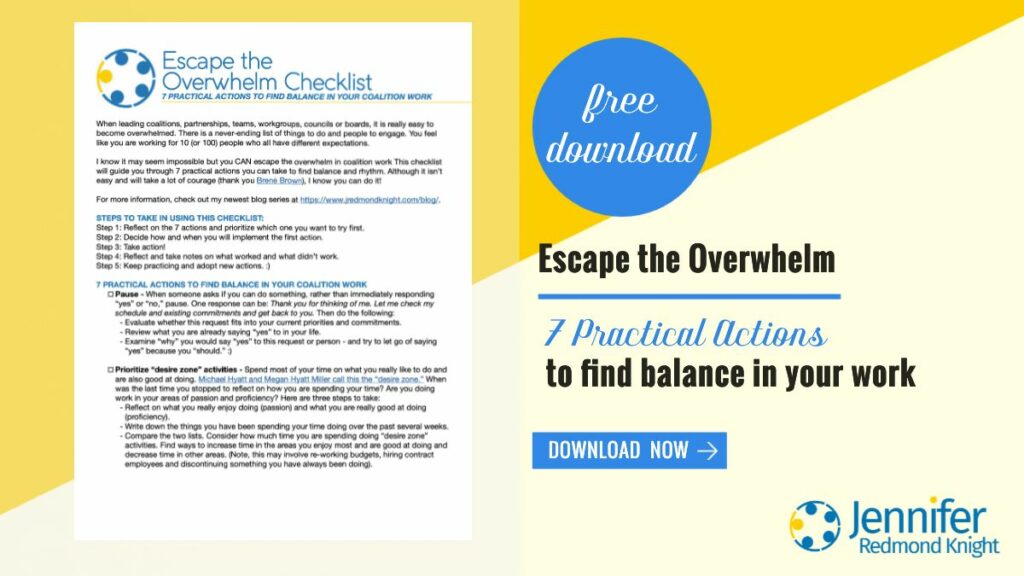As a coalition leader, is there ever a time when you don’t feel busy? Do you feel like you are running from one meeting (zoom) to the next and never really have time to DO any of the work you would like to do? Are you weary and wondering if it is possible for you to reclaim some of your time and energy? If you are answering yes to any – and all – of these questions, then you are going to enjoy this new blog series and my newest free resource, Escape the Overwhelm Checklist.
As someone who has struggled with this most of my life, I get it. You want to take care of the people you are serving, make a real difference in the world and be someone who gets things done. While these are all important, we only have a limited amount of time – and more importantly – energy. And we also want to spend time and energy in other areas of life that are also extremely important – our family, friends and self care. Over the next eight weeks, we are going to explore practical actions you can use to escape the overwhelm. These are the same actions I have been implementing – and re-implementing! Check out the seven actions below.
Pause
Although it’s easy to think we need to immediately answer “yes” or “no,” one of the best ways to escape the overwhelm is to pause before making a decision. When we pause, it gives us a chance to review our other commitments and remember our priorities.
Prioritize “desire zone” activities
Find ways to spend most of your time doing things you enjoy doing and are really good at doing. Michael Hyatt and Megan Hyatt Miller call this the “desire zone.” If you are not sure what those are, then pause (#1) and take time to reflect and write down the things that fit in this category.
Create an ideal week
Creating an ideal week is one of the most proactive things you can do with your time. Rather than remaining reactive to everyone else’s schedule, determine the days and times you will have “meetings” and others that you block to work on those things that require focus and creativity.
Delegate well
When you get really clear on your “desire zone” activities, you are able to see the types of things that would be best for others to do. One of the best places to start are those things you do really well but to not enjoy doing. Since you are good at doing them, you could likely train and coach someone else to do them. Then, you will create time for you to do more of those things that you both enjoy doing and are good at doing.
Practice “no”
When you say “yes”, you are automatically saying “no” to someone or something else. Consider who you really want to say “yes” to, why you want to say “yes” to them and let that help you with practicing your “no” to others.
Create rituals
Rituals are habits and practices that help you transition from one area of life to another. Rituals also help you create boundaries with your time and prevent you from getting “stuck” in email all day! One of the first times I really thought about rituals was when I first started using the Full Focus Planner.
Show self compassion
Practice being kind to yourself. When you get overwhelmed again, recognize it, give yourself grace and try again. Self compassion is a concept emphasized in Brené Brown’s book, The Gifts of Imperfection. If you haven’t read it yet, I highly recommend it!
As you look at this list, is there one that stands out to you? Which one would you like to reflect upon and try implementing first?
For additional guidance, check out my newest free resource, Escape the Overwhelm Checklist.
Click here to register for my my new FREE Masterclass, Clarity in Your Coalition on June 16th at 3 pm ET.
Photo by Vitolda Klein on Unsplash

